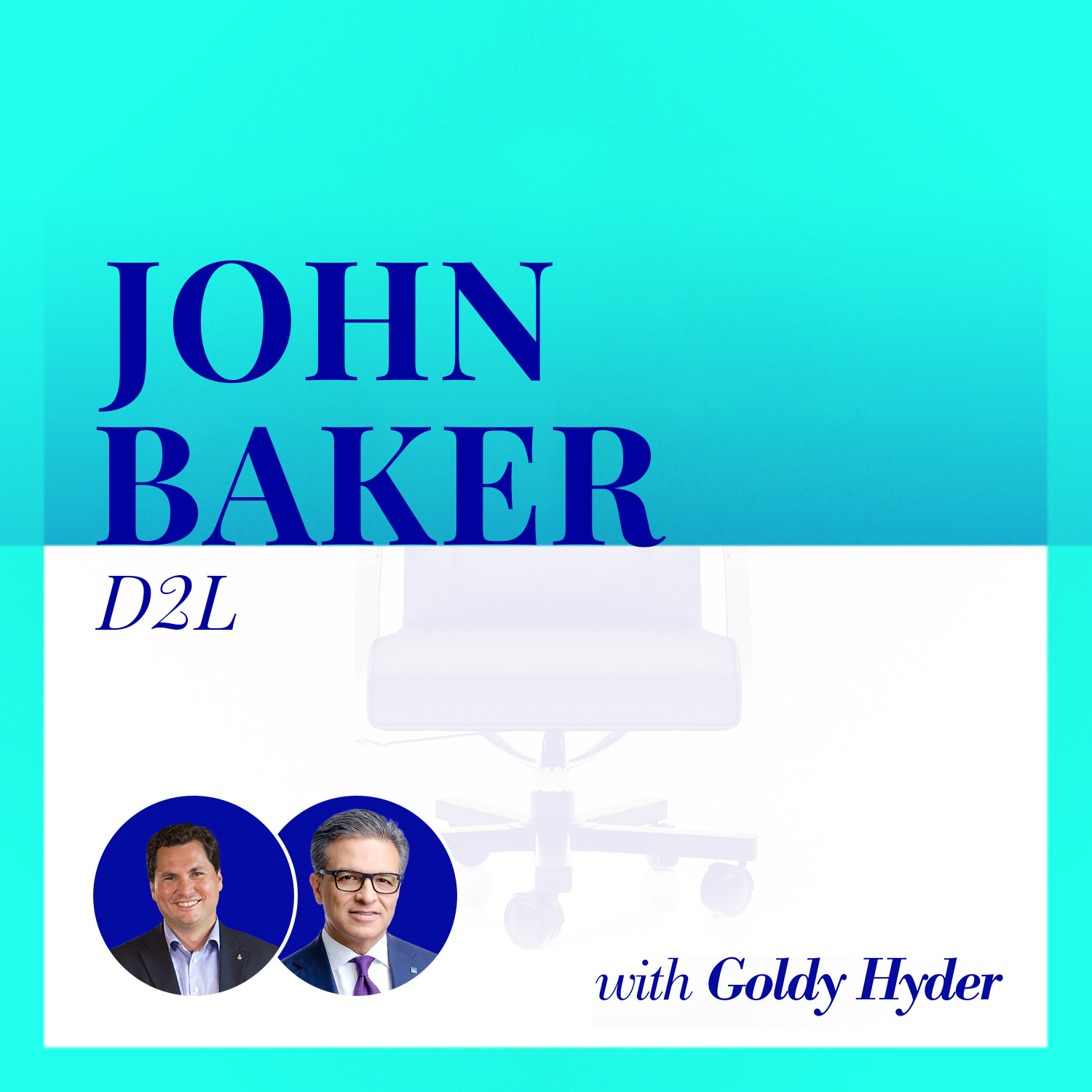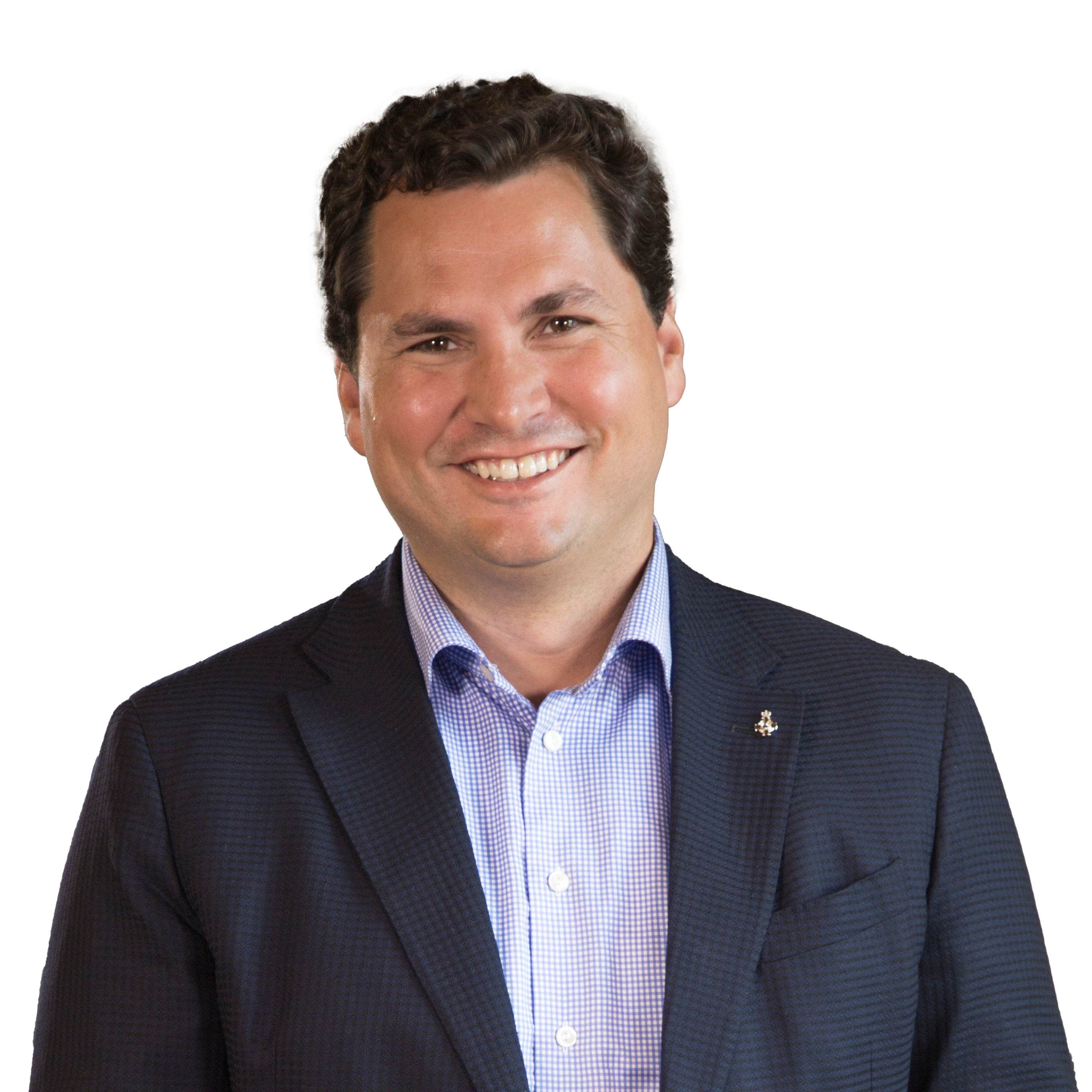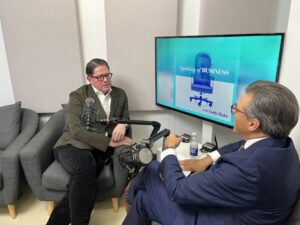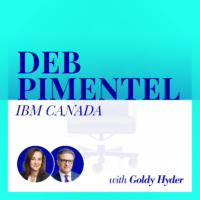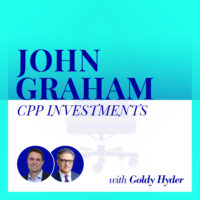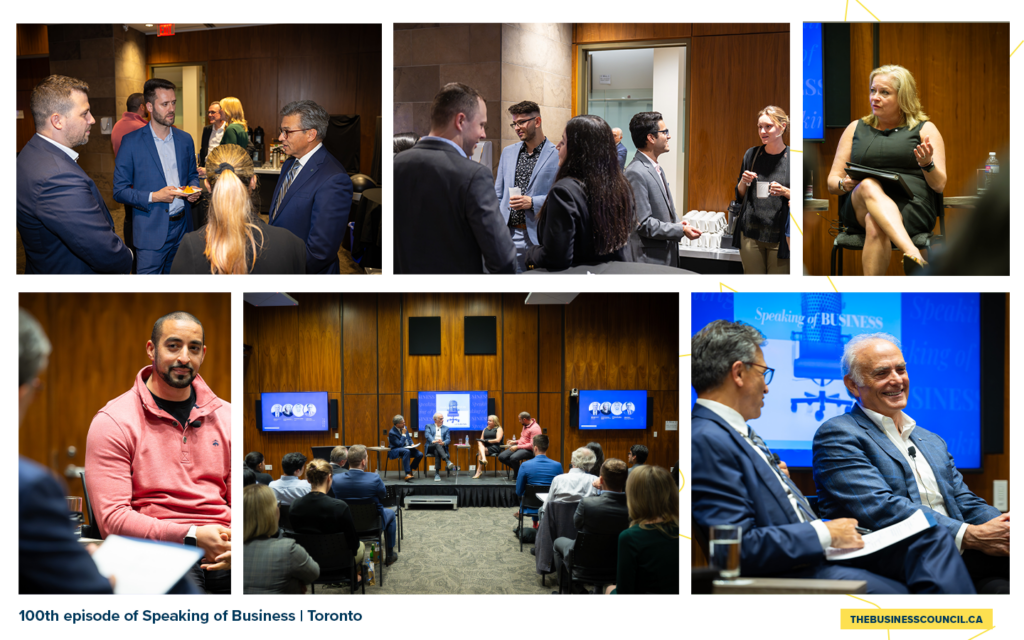“We’ve pulled the future forward here.” John Baker, President and CEO of D2L discusses the future of online learning in the wake of the COVID-19 pandemic and what parents and educators can expect when schools resume in the fall.
Goldy Hyder:
Welcome to Speaking of Business. I’m Goldy Hyder of the Business Council of Canada. When John Baker started D2L more than 20 years ago, chances are he never envisioned a pandemic would create, almost overnight, a world of online learners. D2L, or Desire to Learn, is playing a pivotal role in the COVID-19 crisis. The leader in learning technology is helping schools, universities and organizations around the world. John Baker is the President and CEO of D2L and he has just recently been named by the federal government to its Industry Strategy Council to assist with the COVID-19 recovery plan. John, welcome back to the podcast.
John Baker:
Thank you, Goldy. It’s a real pleasure to join you here today, looking forward to the conversation.
Goldy Hyder:
Well, let’s jump right into the conversation. Twenty years ago online learning was, I would say, a pretty unique concept, certainly new, but a lot has changed since then. We’ve seen change go into overdrive in the last few months. I just wanted to give our listeners a sense of, what have you been seeing and how have you been responding?
John Baker:
Well, not just 20 years ago, moving to online learning was something that was still a challenge even just last year. I think if you look at the education or corporate marketplace, average about 90 per cent of all learning was being done in the classroom, in companies and in schools. And so the ability for us to pivot entirely to a 100 per cent online environment, literally almost overnight, has certainly been a challenge, but yet, also, a great opportunity for us to really have a big impact on people’s lives. It’s certainly setting a new standard for making sure that learning has a better success, if you will, in the face of any kind of environment going forward in the future. We need to build it to be more adaptable, resilient and to stand up to these challenges so that we can remain nimble and provide the education that we need and provide the learning that we’re going to need to adapt and build the future of work, the future of our economy and the future of making sure that we’ve got the next generation, if you will, prepared for what comes next.
Goldy Hyder:
You know who else is having to be nimble and resilient these days, John, parents. Parents across the country have been suddenly thrust into helping their children learn from home. What advice can you offer them? What lifeline can you offer them?
John Baker:
It’s not easy, the transition that many of these schools have gone through.
Goldy Hyder:
Yeah, I think they figured that part out, John. I think they’ve figured that part out.
John Baker:
I think we’ve got to have empathy for the teachers. Many of the teachers have been thrusted into this and have to figure out and cobble together the right learning resources, the right activities to support the learning. We owe it to the teachers to really do a better job in making sure that they’re well equipped with the right resources, the right content, the right experiences, so that that learning in that online environment is as good, if not better, than what it was in the traditional classroom and still supports that teacher in that whole mix.
John Baker:
The role of the parent has become relatively important compared to what it was in the past, where parents are certainly having to step in and provide a very active role in their child’s education. I applaud the parents for doing all that work. As a father with three young daughters, I can certainly understand the impact that this has had on many people’s lives. I think all of us realize now how important it is for us to invest in making sure that that learning experience is as good as it can be for this fall to make sure that we don’t have a repeat of what we’ve just gone through.
Goldy Hyder:
Well, that’s good counsel. I think everybody at some point in time realizes that these are learning moments for all of us, parents included. The appreciation of teachers being really front and centre these days.
John Baker:
Yeah, exactly. I think, for parents, being able to help their kids get through this in terms of helping them become better self-directed learners, helping them listen very carefully to what they’re being asked of in terms of the learning that they’ve got in front of them, helping them prepare for what comes next, whether it’s graduating from grade 12 and getting ready for university or college, or getting ready to go into high school, whatever level that they’re at, making sure that through this pandemic that there isn’t that learning loss, that they’re ready for what comes next is an incredible responsibility to put on the shoulders of parents and for teachers.
Goldy Hyder:
Well, the other part of society that’s also undergoing some immense challenges, given the crisis, is those in the nonprofit sector. I wonder if you could talk to us about D2L and the active role that you’re playing in philanthropy to help people respond to the pandemic?
John Baker:
Well, we’re doing a number of different things. We created, several years ago, a program called our Volunteer Time Off, where we give each one of our employees two days of paid leave to be able to go volunteer into various different organizations throughout their communities. Whether it’s Habitat for Humanity or the food bank or various different charities or nonprofit organizations, the WE foundation, you name it. What we found is that by getting involved in the community, we really build a better connection with not only the community, but with our employees. I would highly encourage others to continue to invest in their communities in this time of great need.
John Baker:
What we’ve also been trying to figure out is how do we leverage our strengths of leveraging learning and then helping to navigate these waters to support the broader community? One example we tackled very early on in this pandemic was pulling together the thought leaders, pulling together the researchers, to pull together a great educational course on how to navigate COVID-19, the health impacts, what you have to do for your family, how you can learn online. All of these different resources we pulled together into a free open course to allow folks in our communities all over the world to be able to navigate better and see their way through to the other side of this recession and this pandemic.
Goldy Hyder:
What are you learning from this experience in terms of your business and how do you think it will change the way you operate as you go forward?
John Baker:
Well, I think all of us are recognizing how much things are changing. I think at the outset of this, we did a very quick test of, “Can we actually work from home and will productivity go up or down?” We very quickly learned that we actually saw productivity increase of all of us working from home. I don’t think we’re going to be in a scenario where we have all of our staff wanting to continue to work from home forever. I think in our case, as we survey our people, there’s a large number that want to return to an office environment, that want that human interaction, that want that social element of that office experience. And so I think there are going to be things that change as we return to work, as we return to these office environments, in terms of how we’ve laid them out and how we’ve organized them to really play up the human elements, the contact, the design, the collaboration, the empathy for each other, being able to work together in different collaborative ways than we did before.
John Baker:
But I also think we’re going to have a new balance, where people have found that they have been actually quite productive working from a home office environment. We’re certainly going to see much more of that in the future. One common thread, and it’s been said many times, is we’ve pulled the future forward here. Things that we were thinking about for 10 years from now have been pulled into this year very quickly. We did a number of white papers on, “What does the future of work, what does the future of learning look like?” I can tell you that our short term road map of, “What are we working on this year?” is exactly what we were thinking we were going to be working on 10 years from now. So that trend I think is impacting almost every sector of our economy.
Goldy Hyder:
Yeah, there’s a lot going on in the business world. Change begets change, as they say. Let’s look back as we wrap up here. Two decades ago, you looked into your crystal ball and you saw a future of online learning. What is your crystal ball telling you now, given how good you were at looking into the future? How do you see things evolving over the next 20 years?
John Baker:
Well, I think we’re going to see a big change. Immediately, the classroom of the future, if you will, is going to be a hybrid or fully online. I don’t think there’s a scenario where we go back this fall to an environment which is pure classroom based. So the leveraging of technology to support that learning experience, whether the student is in the class or online or at home or somewhere else in the world, I think that that’s going to be a new reality for all of us. It doesn’t matter if you’re in a school or a university or a company, that is one thing that we see changed as part of this. That catalyst of change, that big disruptive moment, if you will, has occurred and that new normal is definitely a part of that future, if you will. I also think that as we look at the impact on the workforce, everything that we were talking about even just two years ago, around what 2030 looks like, is happening right now, where the jobs that were there before this pandemic occurred and the jobs that exist after are probably going to look a lot different.
John Baker:
Continuing to invest in those human skills, those durable skills, those resilient, ideally pandemic-proof skills, around empathy and creativity and problem solving and entrepreneurship, all of those things are going to matter more today than they did before. I think investing in programs that help develop those skills is going to become even more critical. Not to mention all of the work that is happening around automation and technology impacting jobs, that certainly is accelerating as well throughout all of this. We need to make sure that we’re ready to, as people come back into the workforce, equip them with the skills that are going to enable them to be very successful in that future of work. That’s not five or 10 years from now, that’s this year and I think we owe it to Canadians across the nation, our employees around the world, to make sure that we’re investing now to equip them for what that future looks like.
Goldy Hyder:
I said last question, but I’m going to sneak one more in. I was just thinking, 20 years ago you were a pretty young man.
John Baker:
Yeah.
Goldy Hyder:
I’m wondering how this crisis is helping you learn to be a better leader?
John Baker:
Well, I think any crisis is an opportunity to really test yourself, to show what you stand for, to communicate better with your employees, with the world around you. I’m incredibly proud of how my team has responded, how we’ve worked very collaboratively with our clients to really adapt to the change. For us, what have we seen? We’ve seen our net promoter score with our clients climb. We’ve managed to have the best uptime in our entire history. In terms of almost six nines of uptime during the middle of this crisis as everyone shifted to fully online. With things that used to take us weeks to do, now take us less than an hour. Our teams have really grown and adapted and shown their flexibility during an incredibly challenging time. I hope that that growth continues. I was just joining the Industry Strategy Council for Canada. When I started my company, I was wrestling with one challenge, which was, “What’s the most important problem I could solve that would have the biggest impact in the world?” I thought about transforming the way the world learns is the area where I could have the biggest impact.
John Baker:
But as part of this, one of the key pillars that we built as a response strategy was, “How can we help others?” Not just making sure our employees are well looked after or making sure our supply chains are looked after or making sure we have great financial strength through this so that we can survive and support others, but, “How do we really truly go out and help our community during this challenging time?” This Industry Strategy Council for me has me thinking about, “What are the most important problems that we, as a country, can solve, that will have the biggest impact on Canadians and the world?” I’m excited about that as an opportunity for us to not just do what we were doing before, but to build things new, in a way that’s going to build a stronger, more resilient country that’s going to be great for all of us.
Goldy Hyder:
Well, that’s a great place to end. Build back better. Thanks for doing this, John.
John Baker:
You’re very welcome, Goldy. Thank you for everything that you’re doing. It matters more today than ever before. Thank you very much for the time.
Goldy Hyder:
John Baker is President and CEO of D2L. If you would like to hear more of our special Speaking of Business conversations about the COVID-19 crisis, you can find them all wherever you get your podcasts or simply go to our website, SpeakingOfBiz.ca, that’s biz with a zed. Until next time, I’m Goldy Hyder. Thanks for joining us. Stay safe.





